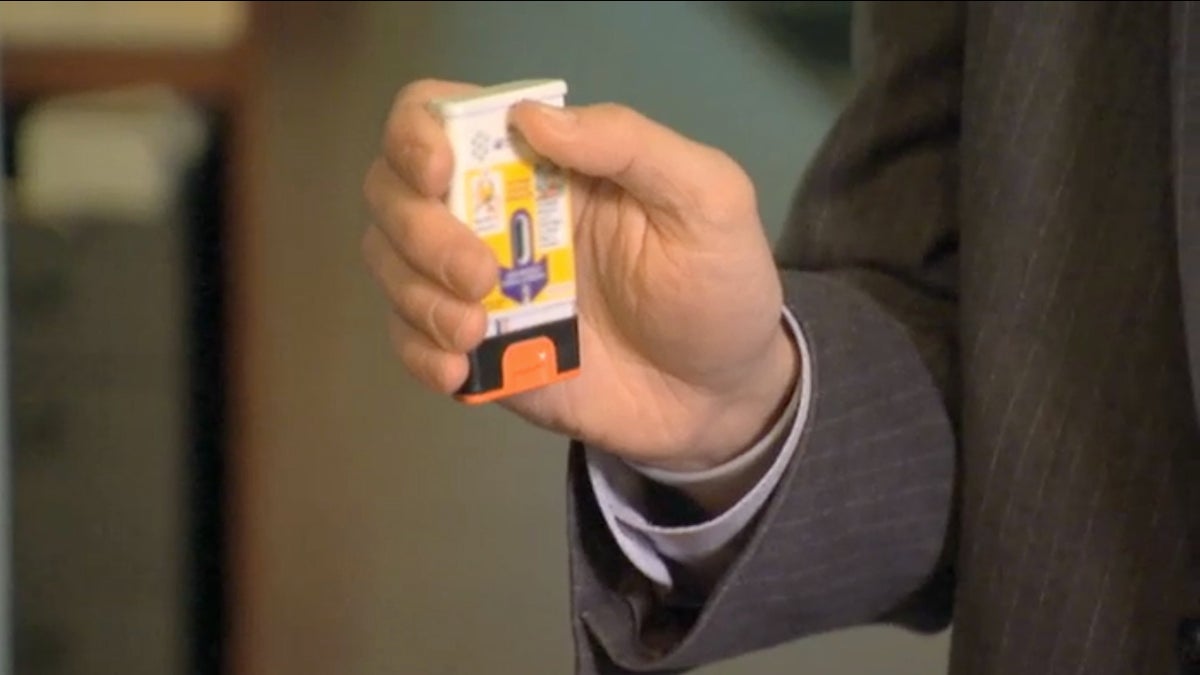Responding to rise in overdoses, FDA approves Narcan auto-injection device

The Food and Drug Administration approved a new automated medical device, brand name Evzio, that can halt a heroin or other opioid overdose in its tracks (Image courtesy of Kaleo Pharma)
Move over EpiPen, a new automated medical device, brand name Evzio, can halt a heroin or other opioid overdose in its tracks.
The Food and Drug Administration approved the new tool on Thursday, after a fast-tracked evaluation process of 15 weeks.
The medicine inside the device, naloxone, sometimes known as Narcan, has been around for years. But the traditional delivery method — needle and syringe — has been a barrier to use, said Dr. Wilson Compton, Deputy Director with the National Institute on Drug Abuse.
He said that overdosing is not new, but “the scale and the increasing numbers of people dying from these substances has created a public health crisis…that’s really what’s driving the new approaches and willingness to try all sorts of new ideas.”
“Having this in an easy-to-use device, that can be administered by minimally-trained persons, is a terrific advance,” says Compton.
Talking technology
Unlike EpiPen, Evzio talks.
A small, plastic and box – about the size of a deck of cards – Evzio speaks in a tinny woman’s voice, instructing the user step-by-step. First, the device asks if the user is ready, then it times the injection for five seconds, and finally tells the user to seek emergency medical attention.
Compton calls this feature one of the device’s strengths, and compares the voiced instructions to another now-commonplace medical technology: defibrillators.
Putting it to use
In Philadelphia, Prevention Point is the only community organization authorized to distribute naloxone. Founded in 1991 as “an underground syringe exchange organization,” it now offers a range of services from case management to HIV counseling.
Program Director Silvana Mazzella, says anything that makes naloxone more affordable and accessible is a step in the right direction. She also says the fast-tracked FDA approval shows that public perception of addiction – and its treatment – is changing.
“I think it’s gaining more traction and it’s going to be seen more as a public health issue and less as an issue that’s related to drug use,” says Mazzella. “Right now when people think of overdose, they think of a certain type of drug, a certain type of person, but people don’t think about this as a medical issue and it is.”
Naloxone is only availably by prescription, so states are taking different approaches to making the technology available to first responders – or perhaps even the general public.
Both Maryland and Massachusetts prescribe and train first responders, outreach workers, and family members of addicts to administer naloxone. Ohio, California, Vermont and New Jersey also have programs in place or are experimenting with pilot programs. In Pennsylvania, officials in Delaware County spoke up earlier this year in support of a proposed bill to permit police to carry the drug.
Mazzella says her organization has reversed 200 self-reported overdoses since 2006 — and that number is likely lower than the true figure.
Nationally, 100 people die from an overdose every day according to the most recent statistics from the Centers for Disease Control.
WHYY is your source for fact-based, in-depth journalism and information. As a nonprofit organization, we rely on financial support from readers like you. Please give today.

